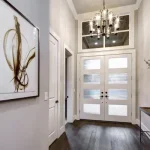
How to Identify Real Hardwood Flooring
Identifying real hardwood flooring can be challenging, especially with convincing alternatives like engineered wood and laminate. Here’s a detailed guide to help you determine if your flooring is genuine hardwood:
Examine the Grain Pattern and Texture
Real hardwood has natural grain patterns that vary from plank to plank. This unique texture, which may include knots and minor imperfections, is challenging to replicate in synthetic materials. Engineered and laminate options often have repetitive designs due to their manufacturing process, which is a giveaway.
Check the Flooring Layers
If you can access a plank edge or end, examine its cross-section. Solid hardwood is a single piece throughout, while engineered wood has a layered structure with a hardwood veneer on top and a plywood or fiberboard base. Laminate is composed of a photographic layer on a composite base with no real wood components. A quick glance at the side profile can often reveal which type of flooring you have.
Test the Weight and Sound
Real hardwood tends to be heavier and denser than engineered wood and laminate. Lifting a plank (if possible) or tapping on the floor can also help. Solid hardwood produces a solid, dull sound when tapped, whereas laminate, which is often installed as a floating floor, can sound hollow or clicky due to the synthetic base.
Look for Natural Imperfections
Hardwood usually has natural imperfections like small knots, color variations, and slight cracks, which add to its unique beauty. By contrast, laminate tends to look uniform and overly consistent. If your flooring appears too “perfect,” it’s likely a manufactured product.
Assess Refinishing Potential
One of the major benefits of real hardwood is that it can be sanded and refinished multiple times over its lifespan. This capability adds significant longevity to the flooring. Engineered wood can be refinished a limited number of times, depending on the veneer thickness, but laminate cannot be refinished at all. If your flooring shows signs of wear and you’re uncertain if it can be restored, this is a reliable indicator.
Knowing the difference between real hardwood and alternatives is essential, as it impacts the floor’s durability, refinishing options, and resale value. Real hardwood remains a premium choice for its authenticity, timeless look, and longevity, while engineered wood and laminate can provide more budget-friendly, moisture-resistant options.
If you’re considering upgrading your flooring or need assistance determining the type of wood you have, Hardwood Floors LLC in Norwalk, CT, can help. We offer expert advice, quality flooring options, and professional installation to suit your needs. For more information or to schedule a consultation, visit Hardwood Floors LLC or call us at (203) 913-4209.





